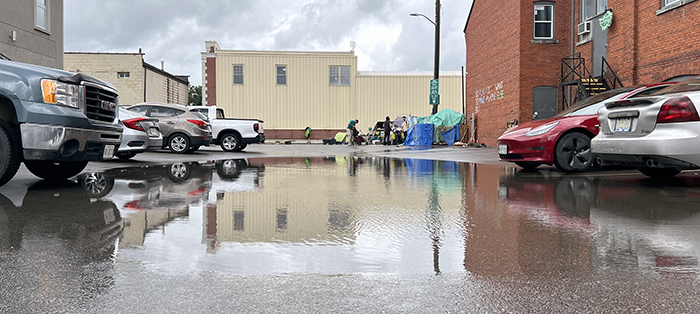
Editor: In response to the article, “Flood forces camp’s relocation,” in the July 18 Chatham Voice, stating that the encampment in Parking Lot #9 was moved due to the flooding, I can assure you that this is not true.
R.O.C.K. (Reach Out Chatham-Kent), the organization that I run, worked tirelessly over three days to move those living there. Our employees, who do outreach regularly and engage with anyone living outdoors, made sure that each person who was living there was given proper supplies, a new tent if needed, and resources to make the move to a new location.
This was because the people living there were no longer safe. Between the rise in online posting calling for action, a rumoured new activist group and a meeting designed to bring forward their demands, and the fact that organizations closest to them were refusing services to anyone living there, it wasn’t hard to see that the safety and well-being of anyone residing in that area was no longer at the top of anyone’s lists.
How we, as a society, resort back to behaviours proven to exacerbate trauma, put up more barriers, and punish people still amazes me. Whatever the reason for anyone living in those circumstances, the issues are a result of the serious lack of funding from higher levels of government, which leads to a serious lack of wrap-around support services.
Why are we all not raging against governments who cut, cut and then cut some more – yet have expectations of those most marginalized to just pull up their socks and get over it?
I would also encourage anyone who wants to know what’s happening with outdoor encampments to use R.O.C.K. as a reference. We are out there most days – as are Chatham-Kent police, and our EMT’s, and housing workers from the municipality – looking to engage, support, and serve. The attention should go to all those workers to show appreciation for the hard work that they do.
And, more importantly, any of these articles should always include the voices of the people who are living there. When referring to overdoses, it shouldn’t be about any organization that has to respond to one, it should be about the person who had to use an unsafe supply, in an unsafe situation, who does not have enough access to services to potentially make life-changing decisions.
When referring to those living in encampments, it should be about the individuals who, for reasons so personal to each of them, have found themselves there, and what would help them at that point in their lives. Each one of those situations involves someone with a name, a story, and should never be used to validate any organization’s importance.
Lastly, as another clarification – to oversimplify and state that there are those who “don’t want to follow the rules” or are “just choosing to be there” – please stop. It’s never so simple, when complex trauma (years of it), which leads to serious mental health concerns, and substance use are involved.
Our “healthy” minds cannot begin to comprehend how people can live long-term in an encampment. And that’s OK, we don’t need to understand it. But when we use such flippant terms such as “they just don’t want to follow the rules,” we’re blaming and shaming, and that invalidates the depth of them as human beings.
If anyone genuinely believes that any one of our friends on the street wants to live that way, please come and talk to me personally. I’ll do my best to really help you to understand. Here’s my email for anyone who wants to initiate a conversation: [email protected]
As always, appreciation towards The Chatham Voice for hearing and posting my thoughts.
Renee Geniole
Executive Director, R.O.C.K.






